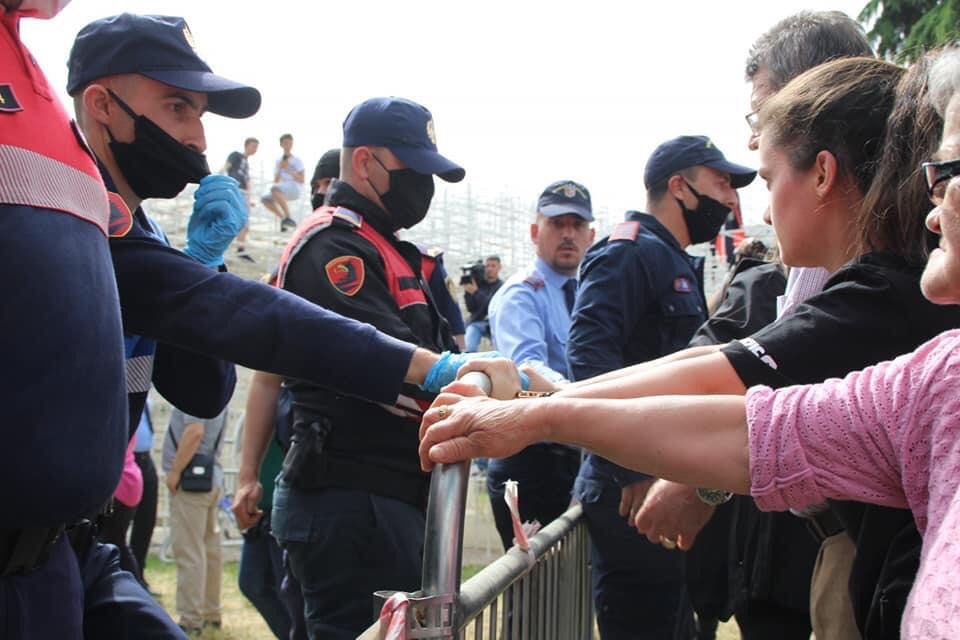

Strategies of political symbolism coupled with a general mob effect culminated in a bizarre act of assault of a mock bunker- a provocative art installation which unwittingly turned into the highlight of the purported anti-government rally. The backbone of the calls for the resignation of the government pivot around the perceived rise of authoritarianism, corruption, the heavy-handed approach vis-à-vis tax evaders, and MPs criminal records. They are most likely to continue under the same clear political backing of the opposition parties.
So what is the significance of the rally and what does it tell us about contemporary Albania?
Key in understanding the rationale of the latest party-driven rally, is the political communication strategy opted by the Albanian Democratic Party. Its restored leadership, has recently promulgated in a lively fashion the notion of civil disobedience at the core of its calls for popular upheaval against the allegedly established ‘new tyranny’ of the ruling coalition - a principle originally coined by XIX century American author Henry David Thoreau in his essay ‘Resistance to Civil Government’.
Historical evidence shows that at large, civil disobedience has proven to be a robust mechanism for social change and its most prominent examples vary from the US civil rights movement, the resistance to British rule in India, the South African resistance to apartheid to more contemporary types of social movements in Southeast Europe. Recent protests in Romania causing the resignation of PM Victor Ponta and those against the Macedonian incumbent Nikola Gruevski, to name a few, all share common features: the embeddedness of institutions in the society and the citizens’ grassroots collective action component.
Despite the appealing public calls of the Albanian Democratic Party leadership to civil disobedience and the far reaching visions which contend the establishment of a new republic and moreover of a new social contract, they arguably carry a significant level of dissonance with societal and political realities on the ground. As a consequence they are doomed to lose traction and fail to achieve the desired impact. There are multiple reasons to believe so.
Firstly, the cumulative effects of misguided and inconsistent neoliberal reforms throughout the country’s democratic transition have contributed to the widening of a pathological gap of mistrust between citizens and the institutions. Low levels of identification of citizens with key democratic institutions have eroded the democratic substance in the country, therefore increasing the propensity of political instrumentalization of societal discontent.
The December 8th rally and near future ones are likely to continue along the lines of a ‘reinvented civil disobedience’- an Albanian Thoreau, where institutions lack societal embeddedness and the grassroots component is overshadowed by political leverage.
Secondly, after the 2013 electoral defeat the Democratic Party of Albania underwent a process of internal transformation, with its historical leader Sali Berisha stepping down from the party’s leadership and the election of Lulzim Basha. On the one hand, many may argue that calls for civil disobedience turned into a de facto mechanism of political manoeuvring. If that is the case, these calls can be read as a perpetuation of the old wine in new bottles, i.e., political polarization as an obstacle to successful reforms and democratic consolidation.
On the other hand, the centre left government coalition has undertaken an ambitious package of policy measures, with the justice reform (strongly supported by the EU and other international actors in the country) being the epicentre of the latter. The stakes are high for Albania, aspiring the opening of accession negotiations with the EU and the acquisition of a more robust political role in regional cooperation in the Western Balkans.
Assuming the cumbersome nature of such ventures and the almost proverbial reputation of detrimental effects that political polarization has had on democratic consolidation in Albania, calls for civil disobedience in midst of such transformational change could turn into a counterproductive move, the consequences of which shall be bared by the already disenchanted citizenry.
The opposition’s anti-government rally is far from being comparable to the transformative power of the Albanian student movements of 25 years ago. Yet, it is an important symptomatic event which raises concern about collective aspects of political action in Albania and the disoriented public conception of justice.